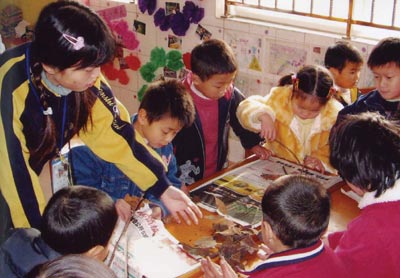| New China Gets Charitable |
| http://www.sina.com.cn 2005/03/09 20:32 thats China |
 Big sister is playing with kids in an orphanage The big organizations are still GONGOs, says Juliana Ma, general manager of the Lifeline Express Beijing Office. "But the trend now is for more NGOs organized by themselves from the bottom up." "NGOs in China didn't start to develop until recently, but they have increased very, very rapidly," says Wu Xiaohong, outreach coordinator of Roots & Shoots, the Jane Goodall Institute of China. "Around the 1990s, many local NGOs were established in China. The reason might be some people's standard of living improved faster than ever before and also for the first time they began to notice the disparity around them." "Gradually [GONGOs and NGOs] will combine...the door is slowly opening," says Xu. "It is very heavy, and so it needs lots of people to push. As more people gather, one day the door will finally open and you will be able to get into the 'main hall.'" Quest for the Holy Grail
By "main hall," Xu means full legal status: The Holy Grail for a grassroots NGO in Chinese mainland. "That's very difficult for a grassroots NGO," says Wang Ming. To obtain this status, an NGO must register at a government ministry by attaching itself to a "superior management unit," a government body that has the authority to approve or deny decisions put forward by NGOs. They also provide administrative and financial support. Examples include The Red Cross, the Ministry of Civil Affairs and the National Family Planning Commission. A new set of comprehensive regulations, the first of its kind in China, which officially went into effect in June 2004, were designed to provide clear guidelines to NGOs wanting to operate in China. "The old sticking point requiring NGOs to attach to a superior management unit is still in place, but many assume it阵 not," says Wang. But he says that what's on paper and the reality are rather different. "In fact," he says, "the new rules [The Foundation Management Regulations] haven't come into practice yet." Zhang Zhirong is managing director of Half the Sky Foundation, an American private foundation engaging in educating children in orphanages in China. "We thought we could register in China as soon as the regulations went into effect," says Zhang. "Actually we still needed a superior managing unit, which translates as: 'You have to wait.'" Despite the reality, others find the legislation encouraging. "The regulations represent a turning point for NGOs in China," says Xu Yongguang. "I truly believe that private charitable foundations will become stronger than public foundations in both quantity and money collection over the next five to ten years, starting five years from now." Juliana Ma sees the regulations as "a step forward." "The present NGOs are in a very early stage and haven't matured yet. Most of their donations come from overseas. The opening policy should help them develop step by step, not all of a sudden." Currently, only 5.1 percent of grassroots NGOs successfully register at the industrial and commercial departments, according to the NGO Research Center statistics. "The grassroots NGOs have a certain breathing space whilst under strict control at the same time," says Xu. "They have developed under the dominance of the government. Generally speaking, they are underdeveloped." As tiny NGOs learn to tap dance, GONGOs must handle the helping hand of Big Brother. The management committee of the Chinese Foundation for Lifeline Express includes members from the Ministry of Health, Railways and Hong Kong and Macao Affairs Office of the State Council. This committee holds sway over all Foundation board decisions. "We work closely with each other," says Nellie Fong. "The Committee has always supported our decisions up to now."
|
|
|
|
|
|
| Annotation |
| 新 闻 查 询 |
| 热 点 专 题 | ||||
| ||||
|
教育频道意见反馈留言板 电话:010-82628888-5747 欢迎批评指正
新浪简介 | About Sina | 广告服务 | 联系我们 | 招聘信息 | 网站律师 | SINA English | 会员注册 | 产品答疑
Copyright © 1996 - 2005 SINA Inc. All Rights Reserved
版权所有 新浪网![]() 北京市通信公司提供网络带宽
北京市通信公司提供网络带宽
